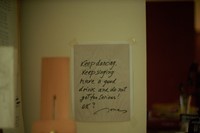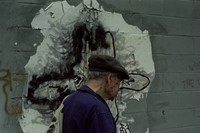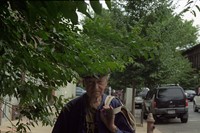Despite being globally lauded as the ‘godfather of underground cinema’, Jonas Mekas dislikes the term. In an interview with collaborator and friend Benn Northover in the latest issue of AnOther Magazine...
"To me cinema is cinema. Cinema is one big tree with many branches. The same as literature. In literature, you don’t just say, 'Oh, I bought some literature'. No, you say, “I bought a novel” by so-and-so , or a book of essays by so-and-so. In narrative cinema a certain terminology has already been established: 'film noir’, 'Western', even 'Spaghetti Western'. When we say "Film Noir" we know what we are talking about. But in non-narrative cinema we are a little bit lost. So sometimes, the only way to make us understand what we are talking about is to use the term avant-garde. Cinema is still a little bit too young, we do not yet have developed terms for all the different, small branches of the cinema tree.
I'm working in a form of cinema that can be described, and has been described, as a diaristic form of cinema. In other words, with material from my own life. I walk through life with my camera, and occasionally I film. I never think about scripts, never think about films, making films. The result though, eventually, is a finished film, shorter or longer. But the film is determined by the material that I have shot. I'm not collecting material to illustrate a certain idea. The idea comes from how I put it together from the material that already exists. I'm a filmmaker but my working procedures are different. All my basic structuring is done during the filming. You know, how long I keep the shot, the exposure, or the speed – slower or faster, etc. That's structuring. And then there is a second stage of structuring that comes later when I begin to put those pieces together. I play with those pieces to make it all into some kind of unity. Sometimes I have to eliminate some pieces. Usually I say, 'When in doubt, cut it out'. The same in writing. You can never go wrong by eliminating. Don’t throw it out, just cut it out.
"In non-narrative cinema we are a little bit lost. So sometimes, the only way to make us understand what we are talking about is to use the term avant-garde."
So what I'm interested in are those moments when people are concentrating, with love. Those moments are anthropological little vignettes. There is an intensity, a concentration in that moment; it’s not theatre, it's not artificial, it's real. There is that intensity. And I seek those moments; I wait for those moments. And sometimes I get them and sometimes I don't get them. And sometimes I totally fail."
Despite being globally lauded as the ‘godfather of avant-garde cinema’, Jonas Mekas dislikes the term. In an interview with collaborator and friend Benn Northover in the latest issue of AnOther Magazine, he credits the excitement and creativity brewing in New York when he first arrived in 1949 as the catalyst for his works. A culture starved young man from Lithuania, “I was like an empty sponge, craving to be filled, and I absorbed everything,” within a month he had bought a Bolex camera, and began creating his testamentary works; first reflecting on life as a Lithuanian in America, then graduating towards the preoccupations of American art community, of which he became a key member.
In the six decades that have passed, Mekas has produced an extraordinary canon of work that has both defined him as an artist, and changed the landscape of cinema itself. Seen from the jerky, handheld angle of his camera, iconic faces flicker by; John Lennon and Yoko Ono, Jackie Kennedy on holiday with her children, Salvador Dalí staging a happening. Mekas worked with Allen Ginsberg and the Beats and founded the Anthology Film archives; he is the man who inspired Warhol to expand into film, yet in all his fragments and featurelength works, there is a total absence of self-aggrandisement. Indeed, Mekas’ creative power lies in the purity and singularity of his gaze; he seeks, with all his subjects, not the extraordinary or the sensational, but the unique, the personal and the true. Here, alongside "As I was moving ahead", a meditative clip from his 365 project, on the day his latest show opens at London's Serpentine Gallery, and accompanied by some intimate shots of the artist at home in Brooklyn, we present an exclusive excerpt from his interview with AnOther, where he considers how he has developed as a filmmaker over the last sixty years.
Jonas Mekas opens today at the Serpentine Gallery, and runs until January 27 2012. A season of Mekas' films begins at BFI Southbank on December 6.


